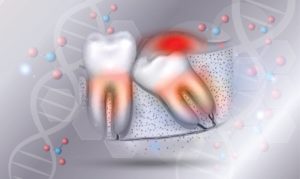
Millions of wisdom tooth extractions are performed each year around the world. In fact, the procedure has come to be regarded as a sort of rite of passage for many teenagers and young adults. Since wisdom tooth removal is so common, it makes sense to ask, “Why do we even have wisdom teeth in the first place?” Let’s talk about the answer to that intriguing question and discuss why wisdom teeth extractions are necessary for most people.
The Reason behind Wisdom Teeth
Most anthropologists and others in the scientific community believe that the reason for wisdom teeth relates to our ancestors’ rather primitive diet. The earliest humans consumed a lot of nuts, seeds, and tough meats. Understandably, all of those raw, unprocessed foods took a heavy toll on the teeth. By the time humans reached their late teens or early twenties, their first and second set of molars may have already experienced significant wear and tear. Hence, the human body compensated by producing a third set of molars — the wisdom teeth.
Advancements in Human Nutrition
As the centuries passed, humans discovered different ways to prepare and process foods. They also began to utilize eating utensils that enabled them to cut their food before putting it in their mouth. Therefore, their teeth experienced much less wear and tear. Eventually, humanity reached the point where the wisdom teeth were no longer necessary for survival.
Wisdom Teeth in Modern Times
As humans have adapted to changing living conditions, our bodies have undergone some slight changes. One of those changes is that, for most people, their mouths are smaller than those of the earliest generations of our race. Unfortunately, while the human genome has shifted to produce smaller mouths, it has not yet eliminated the genes for wisdom teeth. In fact, according to one estimate, about 53 percent of people have at least one wisdom tooth. Many people who develop them find that they do not have enough space in their oral cavity to accommodate a third set of molars.
In modern times, wisdom teeth have become largely regarded as being vestigial structures (unnecessary parts of the human body, like the appendix). Not only are they no longer necessary, but they can also lead to a host of oral health complications — such as overcrowding and an increased risk of infection — as they attempt to erupt from the gumline. That’s why dentists often recommend that the wisdom teeth be extracted during a patient’s adolescence or early adulthood.
Future generations might never develop wisdom teeth. For now, however, they remain an unnecessary albeit intriguing part of human anatomy.
Meet the Practice
Drs. Steve Koo, Thomas Weil, and William Shepard are the oral and maxillofacial surgeons in our practice. Wisdom teeth extractions are among the many services they offer. If your dentist has recommended that you get your third molars removed, our team would be pleased to answer any questions you have about the procedure. Contact us at 713-783-5560 to learn more about how we can serve you.

